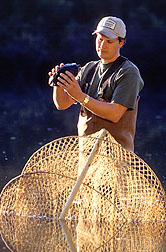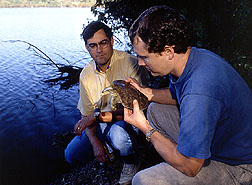Delta MSEA Benefits Local Ecology
|
|
Nature holds many surprises, but trained ecologist Ben Cash never expected to see turtles eating cotton.
No one is sure why a quarter of the turtles studied had cotton in their feces. Normally, sliders—the water-dwelling turtles that Cash, a graduate student at the University of Mississippi, was studying—prefer algae. Cash was monitoring the health of the turtles for a doctoral research project.
"Though the sliders favor algae, these specimens seemed to be opportunistic feeders," Cash says. "Beavers could have dragged the cotton and soybeans into the lake, or egg-laying females could have had them as an on-land snack. But the feeding behavior might also be a reflection of the ecosystem's health. That's why we were looking at it," he says.
However, Cash wasn't just studying turtles' food habits; he was mainly drawing blood samples. And his work was only a small part of research going on at Deep Hollow Lake near the Yazoo River, northwest of Jackson, Mississippi.
The theory is that slider turtles, which may live up to 45 or 50 years, can provide both short-term and long-term indications of an ecosystem's health. The concept is that levels of the stress hormone corticosterone could be a monitoring tool. Based on the blood samples, Cash saw no evidence of slider stress, however.
Cash next intends to study other aspects of sliders—such as reproduction, size, and population levels—and what they show about the lake ecosystem.
Agricultural Research Service ecologist Scott S. Knight gave Cash the opportunity to work on Deep Hollow Lake as part of his doctoral research. Knight, who is in the ARS Water Quality/Ecological Processes Research Unit at Oxford, Mississippi, was looking at conditions and changes at Deep Hollow, including the fish population.
"We saw signs of stress—particularly in the sunfish populations," says Knight.
"The fish were small, and many were diseased. We also saw some hybridization where different species were interbreeding."
Why is Deep Hollow, a 20-hectare (50-acre) oxbow lake that stands between Sunflower and Leflore Counties in Mississippi, getting all this attention?
It's a test lake for a Management Systems Evaluation Area (MSEA), a national effort by the U.S. Department of Agriculture to protect farmlands' watersheds.
When work began on Deep Hollow Lake in 1995, water visibility was at 4 centimeters (1.6 inches), and there were few plants or algae. Today, depending on the time of year, visibility runs 35 to 50 centimeters (14 to 20 inches), and the algae the slider turtles love to eat are coming back.
The MSEA program is designed to test and develop farming methods that will work with nature, instead of damaging water quality. It began in the Midwest in 1990.
Oxbow lakes are created when a river cuts a new path across a large bend, usually during flooding, and isolates a u-shaped section of the river. Oxbows make perfect ecology laboratories because they are essentially closed ecosystems.
In this project there are three lakes: Deep Hollow, Beasley, and Thighman. Each lake represents different kinds of farm management practices and how they affect water ecosystems.
Phillip Barbour farms cotton and soybeans on the land around Deep Hollow Lake. He agreed to help the research teams by using best management practices on the land. That committed him to using not only cutting-edge erosion controls, but also the latest in pollution reduction techniques. Meanwhile, the farmer at Beasley Lake uses structural erosion barriers and the one near Thighman Lake, traditional farming practices. Both serve as comparisons.
"If farmers find that best management practices make economic sense and don't take too much extra effort, that will help ensure they're adopted," says Knight. "It's funny. Even the control lake is getting better. That's because more farmers are seeing the value of improved erosion control and are doing it for themselves."
Implementing best management practices has meant lots of work for Barbour. He planted no-till cotton and soybeans. Tilling loosens the soil, allowing more air to get to plants' roots, but it can contribute to erosion. So Barbour also planted a crop in winter to protect the soil from harsh winds and rain. ARS researchers helped him set pipes in the soil to drain water away without having it run over land, tearing away valuable topsoil. And he planted riparian zones, a system of ditches and strong plants designed to trap soil runoff.
|
|
Barbour also worked with ARS researchers in Stoneville, Mississippi, on weed sensor technology that allows him to use pesticides with precision. This method shows him exactly where weeds are, so he doesn't have to apply herbicide throughout his fields.
These techniques don't stop erosion, but they do reduce the amount of herbicide going into Deep Hollow or other ecosystems. And they could save Barbour money, since he doesn't have to spend as much on agricultural chemicals.
The good things happening at Deep Hollow are just one of MSEA's success stories. There are MSEA projects in other parts of the United States, including Ohio, Minnesota, and Nebraska. Many ARS research locations are committed, through MESA and other projects, to finding new, environmentally sound farm management practices.
The Mississippi Delta MSEA was the first located in the South and the first to investigate ecological benefits beyond changes to water quality. It looks at the entire ecosystem. That's why Ben Cash's turtle project was part of this effort.
Scientists with ARS, the U.S. Geological Survey, and Mississippi State University lead the project.
Other conservation groups, such as Ducks Unlimited, and farm suppliers have also become MSEA supporters in the Delta. And the Mississippi Delta MSEA has enjoyed the endorsement of such agricultural support organizations as the Farm Bureau, Delta Council, and Mississippi Soil and Water Conservation Commission.
The Delta Branch Experiment Station, Natural Resources Conservation Service, Mississippi State University, University of Mississippi, and the state's Departments of Environmental Quality and Wildlife Fisheries and Parks are also involved.—By Jill Lee, Agricultural Research Service Information Staff.
This research is part of Water Quality and Management, an ARS National Program described on the World Wide Web at http://www.nps.ars.usda.gov/programs/nrsas.htm.
Scott S. Knight is in the USDA-ARS Water Quality/Ecological Processes Research Unit, 598 McElroy Dr., Oxford, MS 38655; phone (601) 232-2935, fax (601) 232-2915.
"Delta MSEA Benefits Local Ecology" was published in the March 1999 issue of Agricultural Research magazine.








